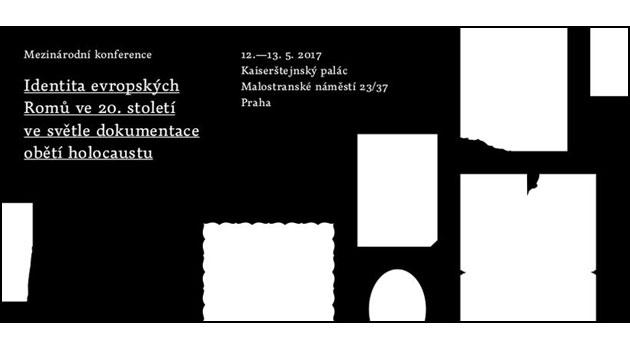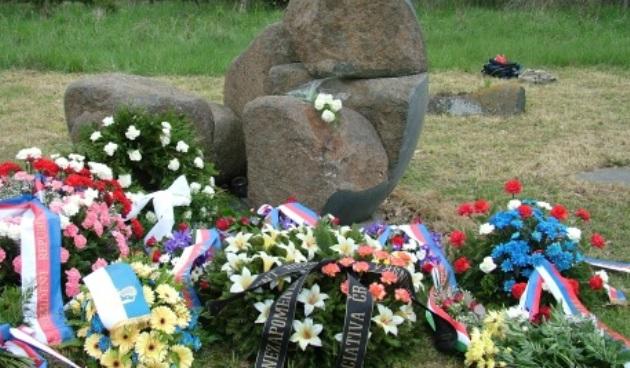DEADLINE 26 APRIL: Int'l conference 11-13 May on "European Roma Identity in the 20th Century in Light of Documenting Holocaust Victims"

The Antikomplex organization and the Terezín Initiative Institute in collaboration with the ROMEA organization and other partners, will be holding an international conference from 11 – 13 May in Prague and at Lety u Písku, Czech Republic during which experts on the documentation of Holocaust victims and modern history in the Central European area will discuss the current state of research in the field of the Romani Holocaust and their experiences with documenting Holocaust victims in general. The expert conclusions of the first day of the conference will be further discussed with members of the public during the second day, and based on those discussions, the experts will subsequently have the opportunity to jointly form an expanded version of existing recommendations to improve the situation not just in the area of the documentation of and research into the Romani Holocaust, but also for improving the fields of education, information, and the social situation of the Romani community in the Czech Republic and other European countries.
BASIC INFORMATION ABOUT THE CONFERENCE
WHEN: 11-13 May 2017
WHERE: Kaiserštejnský palác, Malostranské nám. 23/37, Praha
WEB: www.terezinstudies.cz
Please send inquiries to tereza.stepkova@terezinstudies.cz or +420 776 743 554. Participation in this conference is free of charge.
To attend, please register using the online form. The deadline for registration has been extended until 26 April 2017.
“The history of the relationships among the people living in the Central European region comprises one component of our common identity – of all of us, members of the majority and minorities. To acknowledge this and attempt to comprehend it is one of the basic steps that will lead to a recognition of our common history and shape our common European identity. Looking at the modern history of the 20th century through the historical experience of a particular minority can alter and shift our perception of the traditional narrative of our national histories,” explains Tereza Štěpková from the Terezín Initiative Institute.
“Because the Holocaust is a fundamental, watershed event in modern history, that makes it possible for us to open up discussion of the importance of systematically documenting Holocaust victims for educational purposes, research purposes, and for the purpose of understanding the social position of minorities today in general,” she said, adding that sharing the experiences and views of “our” history as seen from the perspective of ethnic and religious communities, the inhabitants of other states, and various social groups can contribute to changing the relationships between minoriites and “national majorities”. The event is happening as part of a project called “Identity of European Roma in the 20th Century – Database of Romani Holocaust Victims” with financial support from Bader Philanthropies, the Embassy of the Federal Republic of Germany to the Czech Republic, and the European Commission’s Europe for Citizens program on European Remembrance.
The European experts coming to Prague to discuss this topic are:
Dr hab. Prof. Slawomir Kapralski, a sociologist and leading expert on nationalism, ethnicity and identity, collective memory, antisemitism, the Holocaust and Romani communities in European countries. He is a member of the Gypsy Lore Society, the European Association for Holocaust Studies, and the European Academic Network on Romani Studies. He works at the Institute of Philosophy and Sociology at the Pedagogical University in Kraków, Poland.
Emran Elmazi, head of the DIALOGUE department at the Documentation and Cultural Center of the Roma and Sinti in Heidelberg, Germany.
Mag. Dr. Gerhard Baumgartner, scientific director of the Documentation Centre of Austrian Resistance in Vienna, a leading European expert on the Second World War, the persecution of Roma and Sinti, the relationships of the inhabitants of Austria to Nazism, etc. He is the author of many expert publications, including the web application www.romasintigenocide.eu.
Johannes Ibel, expert staff member of the KZ-Flossenbürg Memorial in Germany, which has long been dedicated to documenting the prisoners and victims of the Flossenbürg Concentration Camp and administering a database of them. He authored a project called The Book of The Dead at the Flossenbürg Concentration Camp.
Albert Knoll, head of the Archive and Library at the Dachau Memorial in Germany, who since 1997 has professionally focused on the documentation of and research into the victims of the Holocaust at that camp. In 2015 he won the Archivist of the Year Award from the Scone Foundation in New York.
PhDr. Jana Horváthová, director of the Museum of Romani Culture in Brno, Czech Republic, an historian and expert on questions of the modern history of Romani people, including the Second World War period.
The conference will also be attended by Mr Karel Holomek, a founder of the Museum of Romani Culture in Brno and the chair of the Association of Roma in Moravia; by an historian with the Museum of Romani culture in Brno, Mgr. Dušan Slačka; by the head of the Romani Studies Section at the Department of Central European Studies at the Faculty of Arts, Charles University, Mgr. Helena Sadílková, M.A., PhD.; by Mr Čeněk Růžička, chair of the Committee for the Redress of the Roma Holocaust; Mr Rudolf Murka of Zlín; Mgr. Petr Lhotka, a past historian with the Museum of Romani Culture in Brno and an expert on legal questions connected with the persecution of Roma during the Second World War; and Veronika Patočková, scientific officer for the Stiftung Denkmal für die ermordeten Juden Europas (Memorial to the Murdered Jews of Europe) in Germany, who is in charge of the Romani Holocaust Memorial there as well.
PROGRAM of the CONFERENCE
DAY ONE/ 11 May 2017 (Thursday) 10:00 – 20:00
Experts on the documentation of the Holocaust, education about modern history, and research will meet each other through presentations, round tables and smaller group discussions.
CRUCIAL QUESTIONS AND THEMATIC AREAS:
– How aware are people in Europe and in your country today of the Romani victims of the Holocaust and the modern history of Romani people?
– Why is current awareness as it is?
– What must we document in relation to the Holocaust of the Roma of Europe, and why?
– How are we to best undertake this documentation?
– How are database systems created and how does one use them to work with data, including personal data?
– How are we to analyze and interpret the historical sources used in this area?
– Relationship between documenting the victims of the Holocaust/Shoah and the Romani victims of the Holocaust: What is it im/possible to take advantage of (experience in the area of archival research, data collection and extraction, know-how and systems)?
– What must be subjected to thorough discussion if we want the outcome of the documentation of the Romani victims of the Holocaust to meet the criteria of both the members and representatives of the Romani community and scholars?
– How is the identity of Romani people today influenced by the experience of the Holocaust?
– What is the importance of documentation, education, and research about the Romani Holocaust in relation to the majority society and the position of Romani people in contemporary European society?
DAY TWO/ 12 May 2017 Friday 10:00 – 15:00
Moderated discussions and workshops involving members of the expert group (the participants in Day One) and the broader expert public (activists, educators, journalists, researchers, university students, etc. )
CRUCIAL QUESTIONS AND THEMATIC AREAS:
– Why are topics connected with Romani people controversial in European states?
– What can we do, or do better, to change/improve this situation?
– Examples of good practice and of the limitations of the modern history of Romani people and our European identities.
– “Two worlds” – the world of academia and experts, the world of activists, and their interrelation. How do they relate to education?
– The role of the media, the Internet and social media.
– FORMULATION of a “List of Recommendations”: How to open up discussions of modern European history; multicultural vs. national perspectives on modern history.
ARTS PROGRAM 16:00 – 18:00
Theatrical presentation: Modrá je dobrá/ Supermax / Neprojdeš
Film screening: Premiere of the documentary film “JOŽKA”, about Jozef Miker and Lety u Písku (RomaTrial)
DISCUSSION
Discussion program about the importance of and responses to the book “Česká cikánská rapsodie” (Bohemian Gypsy Rhapsody) by historian Jan Tesař about the entrancing life story of the partisan Josef Serinek (Publisher: Triáda)
THROUGHOUT THE CONFERENCE
Individuals and organizations will exhibit and share their informational and promotional materials.
DAY 3/ 13 May 2017, Saturday 10:00 – 17:00
Visit to the former concentration camp at Lety u Písku to attend the traditional commemorative ceremony honoring the memory of the Romani victims of the Holocaust.
